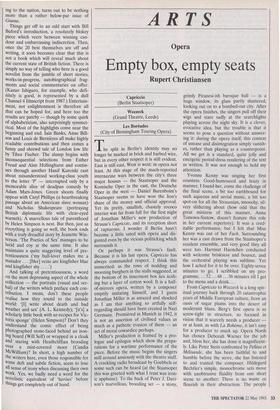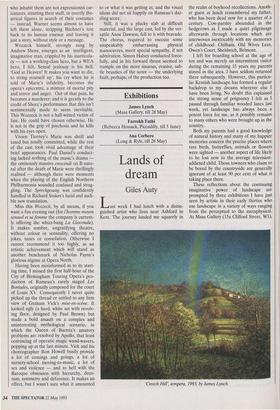Opera
Empty box, empty seats
Rupert Christiansen
Capriccio (Berlin Staatsoper) Wozzeck (Grand Theatre, Leeds) Les &wades (City of Birmingham Touring Opera)
The split in Berlin's identity may no longer be marked in brick and barbed wire, but in every other respect it is still evident. East is still east, West is west: in opera not least. At this stage of the much-reported internecine wars between the city's three major houses — the Staatsoper and the Komische Oper in the east, the Deutsche Oper in the west — Daniel Barenboim's Staatsoper seems to have won the lion's share of the money and official approval. Yet its pretty, smallish, chastely rococo interior was far from full for the first night of Jonathan Miller's new production of Strauss's Capriccio, and its reception short of rapturous. I wonder if Berlin hasn't become a little sated with opera and dis- gusted even by the vicious politicking which surrounds it.
Or perhaps it was Strauss's fault. Because it is his last opera, Capriccio has always commanded respect. I think this unmerited: as the rows of nodding and snoozing burghers in the stalls suggested, at the bottom of its innermost box lies noth- ing but a layer of cotton wool. It is a hall- of-mirrors opera, written by a composer emptily imitating himself, and I guess Jonathan Miller is as amazed and shocked as I am that anything so artfully self- regarding should have been created in Nazi Germany. Premiered in Munich in 1942, it is not an assertion of civilised values as much as a pathetic evasion of them — an act of moral cowardice perhaps.
Miller's production is framed by a pro- logue and epilogue which show the prepa- rations for a wartime performance of the piece. Before the music begins the singers mill around anxiously with the theatre staff. A crackling radio broadcast by Goebbels or some such can be heard (at the Staatsoper this was greeted with what I trust was iron- ic applause). To the back of Peter J. Davi- son's marvellous, brooding set — a stony, grimly Piranesi-ish baroque hall — is a huge window, its glass partly shattered, looking out on to a bombed-out city. After the opera finishes, the singers pull off their wigs and stare sadly at the searchlights playing across the night sky. It is a clever, evocative idea, but the trouble is that it seems to pose a question without answer- ing it: during the opera itself, this context of unease and disintegration simply vanish- es, rather than playing as a counterpoint. All we get is a standard, quite jolly and energetic period-dress rendering of the text as written. It was not enough to hold my attention.
Yvonne Kenny was singing her first countess. Good-humoured and feisty in manner, I found-her, come the challenge of the final scene, a bit too earthbound for such aqueous and aerial music, a bit too spot-on for all the Straussian, smoothy, sil- very slithering about (how odd that the great mistress of this manner, Anna Tomowa-Sintow, doesn't feature this role in her current repertory). It was a cred- itable performance, but I felt that Miss Kenny was out of her Fach. Surrounding her was a cast drawn from the Staatsoper's resident ensemble, and very good they all were too. Hartmut Haenchen conducted with welcome briskness and bounce, and the orchestral playing was sublime. Yet how I ached for it to be over. Eighty-seven minutes to go, I scribbled on my pro- gramme, ...52 ...48 ...36 minutes till I get to the menu and a drink....
From Capriccio to Wozzeck is a long spir- itual journey back through 20 catastrophic years of Middle European culture, from an oasis of sugar plums into the desert of modernist blues. Berg's first opera is so screw-tight in structure, so focused in vision that it scarcely needs a producer or at least, as with La Boheme, it isn't easy for a producer to muck up. Opera North has chosen Deborah Warner for the job and, bless her, she has done it magnificent- ly. Like Peter Stein confronted by Pelleas et Melisande, she has been faithful to and humble before the score, she has listened to and trusted the composer. Hildegard Bechtler's simple, monochrome sets move with unobtrusive fluidity from one short scene to another: There is no waste or flourish in their abstraction. The people
who inhabit them are not expressionist car- icatures, strutting their stuff, or overtly the- atrical figures in search of their costumes — instead, Warner seems almost to have left them alone, stripping Biichner's text back to its human essence and leaving it just a story, without style or a message.
Wozzeck himself, strongly sung by Andrew Shore, emerges as an intelligent, imaginative man, crippled by his inarticula- cy — not a working-class hero, but a WEA hero, I felt. Sexual jealousy is his hell. `God in Heaven! It makes you want to die, to string yourself up', his cry when he is told of Marie's infidelity, becomes the opera's epicentre, a mixture of mortal pity and terror and anger. Out of that pain, he becomes a murderer: and it is greatly to the credit of Shore's performance that this isn't sentimentally made to seem inevitable. This Wozzeck is not a half-witted victim of fate. He could have chosen otherwise. He is not in the grip of psychosis and he kills with his eyes open.
Vivien Tierney's Marie was shrill and taxed but totally committed, while the rest of the cast took vivid advantage of their brief appearances. Paul Daniel's conduct- ing lacked nothing of the music's drama the ominously massive crescendi on B natu- ral after the death of Marie were thrillingly realised — although there were moments when the playing of the English Northern Philharmonia sounded confused and strag- gling. The Sprechgesang was confidently handled in Richard Stokes's lucid and audi- ble new translation.
Miss this Wozzeck, by all means, if you want a fun evening out (for l'homme moyen sensuel et sa femme the company is current- ly offering the whizz-bang La Gioconda). It makes sombre, ungratifying theatre, without colour or sensuality, offering no jokes, tunes or consolation. Otherwise I cannot recommend it too highly, as an artistic achievement which will stand as another benchmark of Nicholas Payne's glorious regime at Opera North.
Having been misinformed as to its start- ing time, I missed the first half-hour of the City of Birmingham Touring Opera's pro- duction of Rameau's rarely staged Les Boreades, originally composed for the court of Louis XV. Consequently I never quite picked up the thread or settled to any firm view of Graham Vick's mise-en-scene. It looked ugly (a hard, white set with revolv- ing floor, designed by Paul Brown) but made a bold assault on a complex and uninteresting mythological scenario, in which the Queen of Bactria's amatory problems are resolved by Apollo, that least convincing of operatic magic wand-wavers, popping up at the last minute. Vick and his choreographer Ron Howell busily provide a lot of comings and goings, a lot of nursery-school moving-to-music, a lot of sex and violence — and to hell with the Baroque obsession with hierarchy, deco- rum, symmetry and deference. It makes an effect, but I wasn't sure what it amounted
to or what it was getting at, and the visual idiom did not sit happily on Rameau's daz- zling score.
Still, it was a plucky stab at difficult material, and the large cast, led by the ver- satile"Anne Dawson, fell to it with bravado. The chorus, required to execute some unspeakably embarrassing physical manoeuvres, merit special sympathy, if not admiration. Simon Halsey conducted force- fully, and in his forward thrust seemed to trample on the more sinuous, evasive, sub- tle beauties of the score — the underlying fault, perhaps, of the production too.



















































 Previous page
Previous page